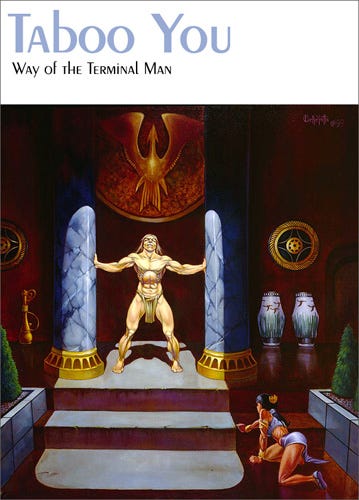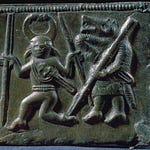This is the third of a series of conversations that James and I had over the past months, while we have been working on the novel “Vunak of Antares”, about a range of subjects linked to ideas of personal survival which will be published here on the One In One Journal.
Previous instalments can be found here:
“The Forest Passage” (1951)
This one ended up being a wild ride as we set out on an exploration of ideas from Ernst Junger’s book “The Forest Passage” as a means to resist control and coercion to attempt to retain personal autonomy and ultimately, the soul, in an oppressive environment, be that personal, organisational (employment) or perhaps in these times that are upon us, a larger social scale…
Topics:
Introduction / brief over view of Junger’s works / The forest passage /Junger’s early life / shot in the head / suicide by artillery / survivor guilt / a two man offensive /before and after WW2 – from his guts to his soul – beyond ideology / on being an “outlier” / supermarket night-captain / staying out of the hierarchy /I‘m still hated by hundreds of people… / why James will never be on The Joe Rogan Show… /A banned writer / The threat of questions / submission or resistance at the voting booth / Examples from The Iliad: informers / Timur and the zero trust society /John Milton and Paradise Lost / The loneliness of the Forest Passage /The “sin” of following a spiritual path on your own / A dangerous dude / inaction as action / Taboo You: The way of the terminal man / The illumination of Harm City / Observations on the Dominican stripper hierarchy / Juju Quartermain / The trafficker - “You’re drunk – now we can be friends!” / Wake up dead / Male resistance to inaction as action / C S Lewis / Combative Instinct / Women that scare men (and the Mating rituals of the Hood Rat!) / End of part one
Part two will follow shortly - hit the subscribe button for notifications.
Become a paid supporter and join the ranks of those esteemed human beings that help keep this endeavour going. Thank you! Jeth
Links to other works also referenced:
Jeth Randolph and James LaFond:
James LaFond:
Taboo You: Way of the terminal man (Click to buy)
Ernst Jünger:
The Forest Passage (Click to read)
The Storm of Steel (Click to read)
Ernst Junger: Interwar Articles (Click to read)
C.S. Lewis
“C. S. Lewis's book "The Abolition of Man," published in 1943, is a significant work on education and moral values. It originated as the Riddell Memorial Lectures, three lectures delivered at the University of Durham in February 1943.
Many people regard this as Lewis’s most important book. In it, he argues that education, both at home and in schools, needs to be conducted in the context of moral law and objective values.
Throughout the book, Lewis argues for an objectivist position in aesthetics and morality, contending that qualities and values inhere in things and positions and are not just projected onto them.
In "The Abolition of Man," Lewis sets out to persuade his audience of the importance and relevance of universal values such as courage and honour in contemporary society. Both astonishing and prophetic, this book is one of the most debated of Lewis's extraordinary works. National Review chose it as number seven on their "100 Best Non-fiction Books of the Twentieth Century".
The book is divided into three lectures. In the first lecture, "Men Without Chests," Lewis deconstructs an educational model subtly imposed on children via a language arts textbook, which he renames to protect the authors. The unstated world-view behind the textbook serves to inoculate young minds against objective values by identifying all values with feelings and emotions.
In the second lecture, "The Way," Lewis asserts that the practical result of education in the spirit of the textbook must be the destruction of the society which accepts it.
This happens when societies become unmoored from objective standards, called variously "natural law," "traditional morality," or, as Lewis labels it, "the Tao".
In the concluding lecture, "The Abolition of Man," Lewis describes what happens when his first two lectures meet means, motive, and opportunity. "Conditioners" will arise to craft values and shape emotions outside the Tao, and they "will be armed with the power of an omni-competent state and an irresistible scientific technique: we shall at last get a race of conditioners who really can cut out all posterity in what shape they please. This process has already begun as Lewis forewarned.”
The Abolition Of Man (Click to read)
Robert-Sepehr
1666: Redemption through sin (Click to read)
Copyright © 2025 by Jeth Randolph
All Rights Reserved.
No part of this work may be reproduced or reprinted without permission in writing from the author.
Third-party information and viewpoints do not represent my personal views or work. This is not legal advice. This content is purely educational and does not advocate for breaking any laws. Do not break any laws or regulations. Consult with your solicitor.












Share this post